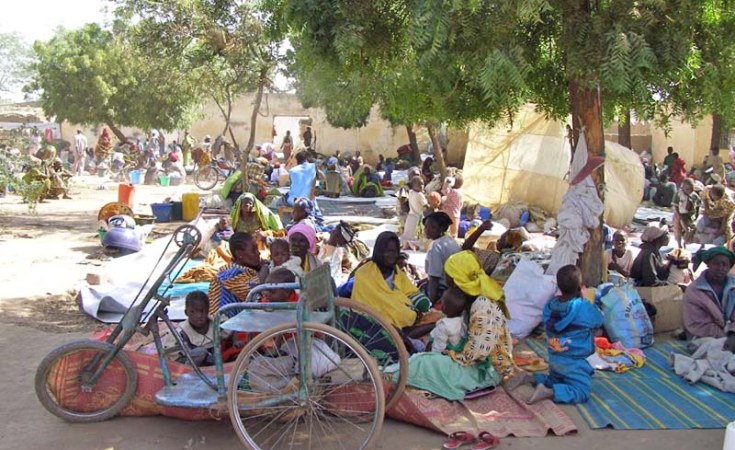Kousseri — Just three days after moving to her new, permanent home as a Chadian refugee in Cameroon, 55-year-old Esther Deborah walks directly to her tent at the edge of a freshly-erected camp. "The house is not much farther," she reassures us with every other step.
She folds back the crisp white pieces of fabric that make up the door, revealing her daughters — ages eight and 10. "We are suffering here," she says. "But we can't go back to N'Djamena [Chad's capital] yet. Our house was destroyed—they stole everything."
Scared to go home — and unsure of what she could go back to — Esther Deborah will stay in northern Cameroon for now.
After spending two weeks packed with other refugees into the town of Kousseri, near the border with Chad, she came to the new camp – which is called Maltam – knowing that the move meant a harder, longer trip home to Chad, but a more extended and stable stay as a refugee.
When more than 30,000 Chadians from N'Djamena fled over the border to escape a rebel assault on the capital more than two weeks ago, they settled anywhere and everywhere they could: in homes, churches, school yards and empty lots.
The most populous site was just a stone's throw from the border. Those sleeping outside had only the blankets and mats they could carry from home. At a time of year when temperatures soar in the day and plummet at night, the desert air bit them harshly until aid came. Women sold vegetables in the camps and the main markets to survive.
It took just days for aid to come. In trucks and buses and however they could, agencies poured into Kousseri, leaving all the quiet town's few hotels overbooked. Some aid workers made their own hotels with tents or the back of SUVs. Personnel came from everywhere they could. Many had been evacuated from N'Djamena, albeit in a more orderly fashion than the refugees. Others came from Dakar, Geneva, and other parts of Cameroon.
By February 16, the refugees were being moved to Maltam, where officials working for the United Nations High Commissioner for Refugees expect 20,000 or so to remain in the medium term.
The temporary arrangements in Kousseri and the permanent camp at Maltam could not be more different – and purposely so.
While Kousseri was crowded, the new camp feels empty and isolated. Tents are pitched on a strip of land 32 kilometers outside of town, where their triangular tops are the only shape obstructing the horizon. The only other settlement in sight is a small dusty village. Unroofed mats have been replaced with proper tarp coverings; anonymity replaced by meticulous registration. Instead of the town market is a line of women, selling a few tomatoes they have left.
Many refugees who fled into Cameroon first seemed tempted to stay. "We have no desire to go back for now," said 20-year-old Patrice Djerane, who left N'Djamena by foot with his mother and aunts. Fleeing political instability, and perhaps poverty too, people whose homes were looted, pillaged or worse found at least a bit more security in Cameroon – and the chance to earn livelihoods in commerce and trade in Kousseri.
But housing the refugees in town made counting and caring for them impossible. Aid workers say that at first the refugees stayed in the camps by night, and returned into Chad by day to inspect the damage. As aid arrived, the tide turned. Many slept in their homes in N'Djamena, returning to Kousseri to receive aid during the day. Numbers in the make-shift camps varied from hour to hour.
Maltam is easier, more permanent – and more difficult to live in for those who want to make their own living or shuttle back and forth to Chad. Its isolation means there is little money to be won in trade, and few goods to sell and hawk to compatriots.
Now, it is possible to see how many refugees are strongly motivated to stay in Cameroon. NGOs will know what supplies they will need, and how often. And Maltam's new residents will know they can rely on a steady schedule of food and medicines.
Many of the refugees can be expected to choose Maltam and its isolation over returning to Chad. The rebel assault on N'Djamena was the first time the rebels, usually menacing in eastern Chad, reached the capital. They stormed the capital with a strength that surprised and traumatized residents.
Men, women, youth, and children alike say the war is not over, and they will stay until it is — be it in Kousseri, Maltam, or elsewhere.


